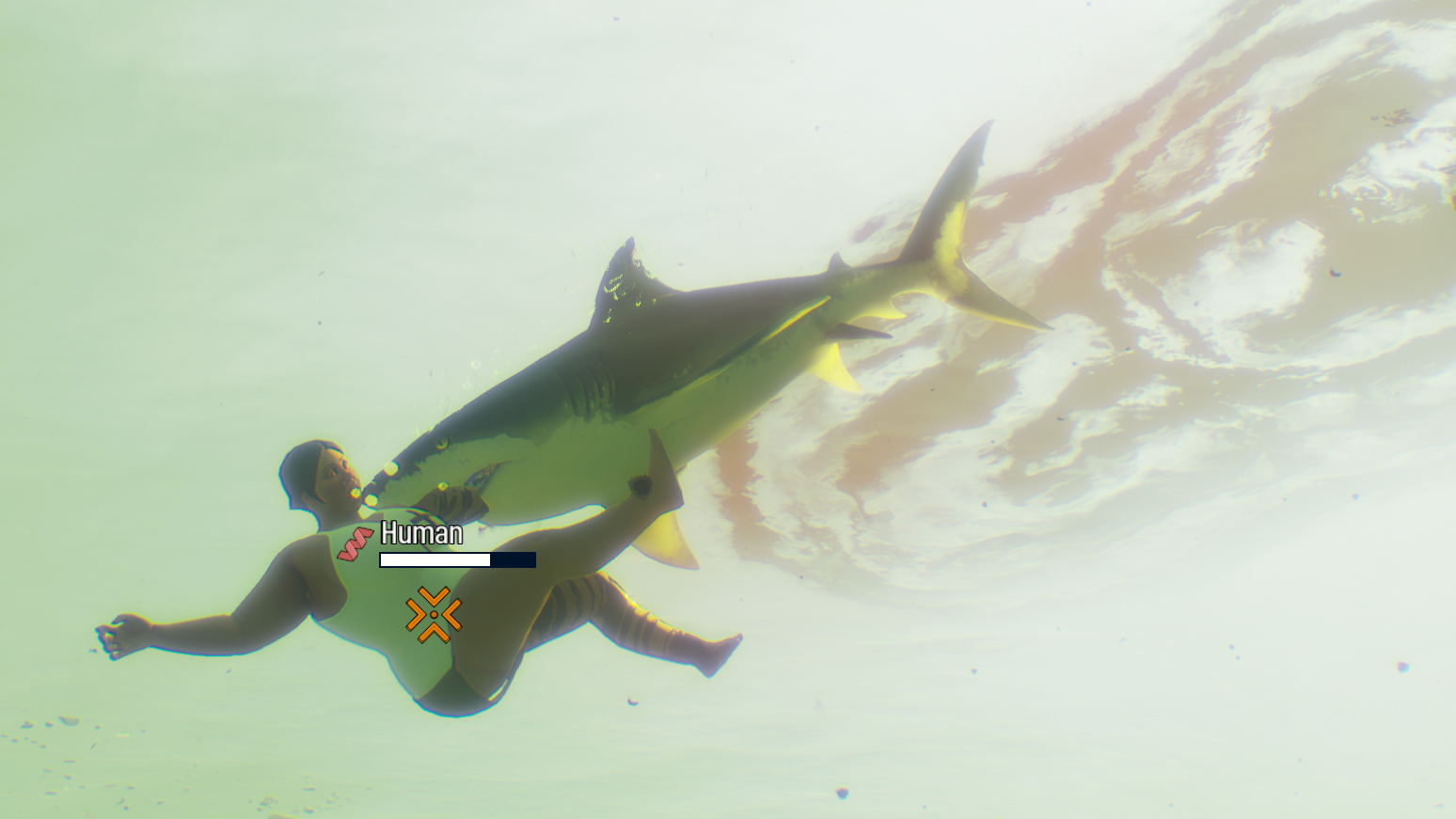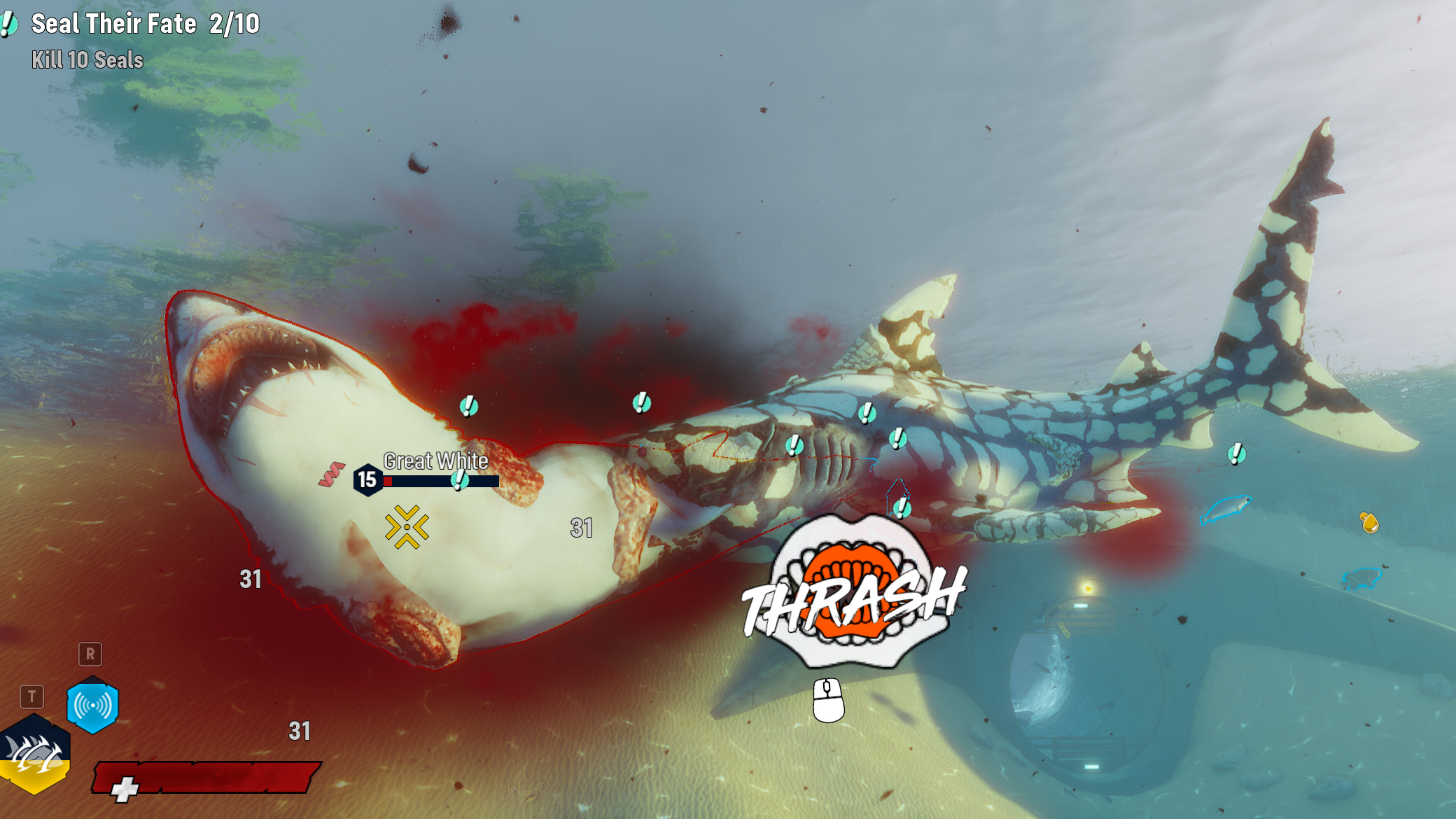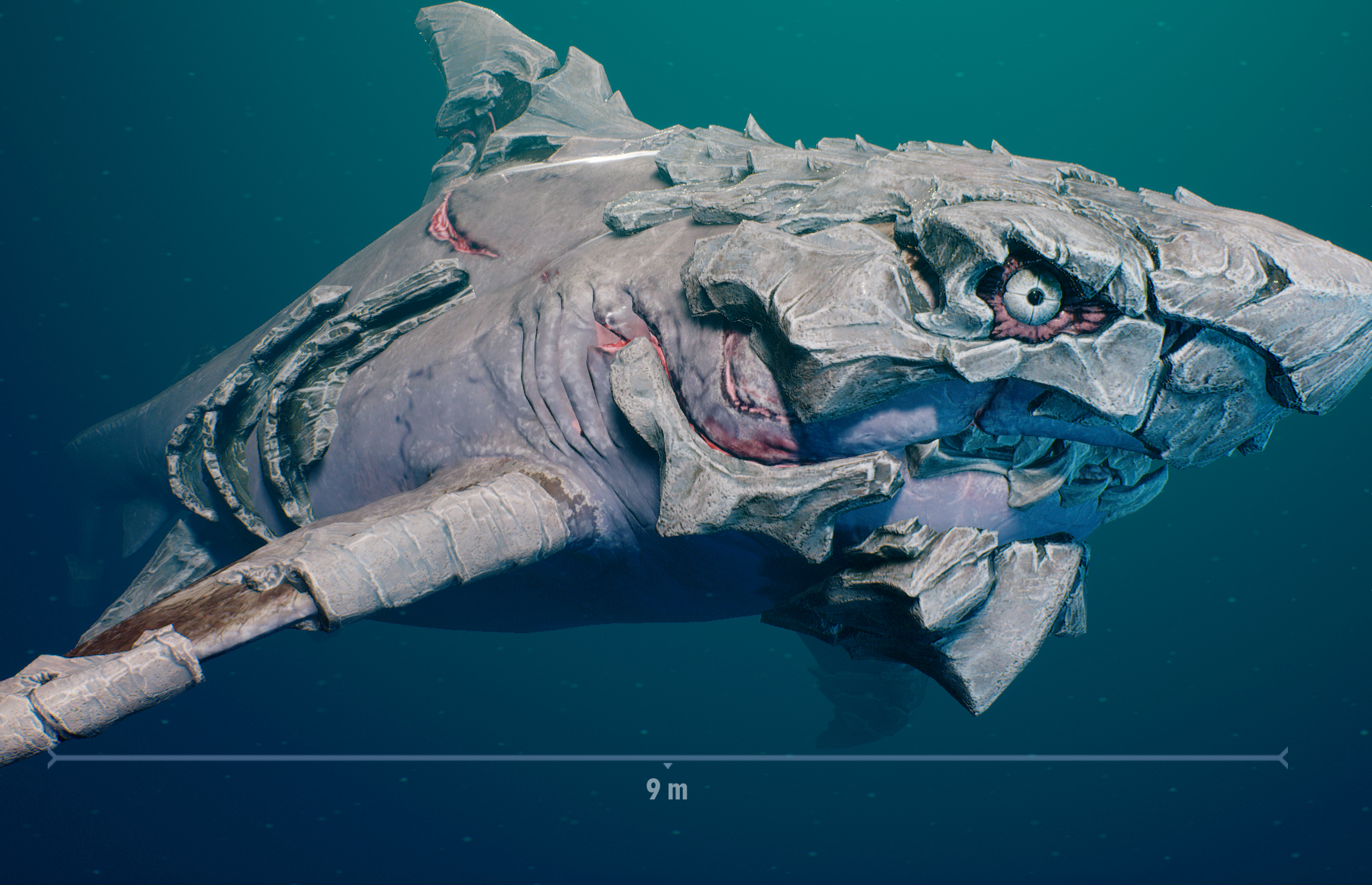Our Verdict
It looks great, but the fun and novelty of being an eternally hungry shark wears off quickly.
PC Gamer's got your back
This review was originally published in May 2020. We have republished it in 2021 to coincide with Maneater's Steam release.
I've lost track of how many people I've eaten. My mission was to consume 10 golfers, and since people don't golf in the ocean I had to jump out of the water and shimmy my way onto the golf course to start chowing down. Before I could finish my snack, three patrol boats filled with gun-toting shark hunters appeared, so I ate them, too. I'm probably up to about 17 humans eaten now, though I still need three more golfers in my belly to finish my gory quest.
What is it? Action-RPG where you are a very hungry shark
Expect to pay $40
Developer Tripwire Interactive
Publisher Tripwire Interactive
Reviewed on RTX 2080, Intel i7-9700K , 16GB RAM
Multiplayer None
Link Official site
More hunters in patrol boats and on jetskis arrive so I consume them too, along with a few divers. And then a celebrity shark hunter appears, flanked by several escort boats. It's Candyman Curtis, important enough to warrant his own introduction in a cutscene. This is a boss fight, but... he's still just another human, right? No superpowers, no suit of amor, no massive meter of hit points. I leap from the water, snatch Curtis from his boat, and swallow him in a few bites while I swim away. Defeating a human in a boss fight is no big deal when you're a goddamn shark.
Sharks only do three things, according to Matt Hooper in the 1975 film Jaws. They swim and eat and make little sharks. In Maneater, Tripwire's action-RPG, you just swim and eat (and sometimes bellyflop onto a golf course), which doesn't sound like enough to propel you through an entire open world RPG. And unfortunately, it isn't. Even considering I finished the main storyline in under eight hours, I still got pretty bored with the repetitive swimming and eating activities long before the end.
While you don't make little sharks in Maneater, you begin the game as one, a baby bull shark cut from the belly of your dying mother by a cajun shark hunter named Scaly Pete. Pete marks you with a scar and throws you back into the water after you bite off his hand, and you both set out for revenge.
To have your final showdown with Pete, you'll need to become quite the adversary, growing from a baby shark (doo-doo, doo-doo, etc.) to a teen, then an adult, and finally a megashark, gaining new abilities and attacks along the way and upgrading them using nutrients from the endless supply of creatures and people you consume.
There's a lot of appeal in growing from a little fish to a hulking leviathan, but there's just not enough variation in the things you do along the way. Eating 10 of something—humans, turtles, fish, seals, other sharks—is initially fun. Humans scream, animals struggle, blood fills the water and coats beaches and boats. Thrashing your shark's head by wiggling the mouse back and forth while holding your prey quickly reduces them to a cloud of chum. But doing it again and again (and again), the gruesome novelty wears off quickly and it becomes a mindless exercise.
There are quests to kill single large predators, too, like a gator, barracuda, or a fellow shark, and more difficult battles against apex predators like an orca in a Sea World-like arena and an ancient sperm whale based on Moby Dick. But combat and enemy AI in Maneater is pretty sloppy, and I eventually abandoned careful evasion and timed strikes when I discovered that just spamming my attacks worked far better. The orca boss wouldn't pursue me when I went to eat fish to regain my health, meaning it was easy to whittle him down to bloody chunks. I defeated Moby Dick by ramming him into the sea floor, where he got stuck. Then I just floated there and slowly chewed him to death.

Humans scream, animals struggle, blood fills the water and coats beaches and boats
Human shark hunters show up when you begin terrorizing other humans, which gives you a GTA-like wanted level. And shark hunter bosses only arrive when you've driven up your threat level by killing loads of generic hunters. Most bosses, like Curtis, are just standard humans with a big gun, which I actually kind of appreciate. Once a human boss is in the world you can eat them just as quickly as you would any other person. It's refreshing. A few bosses near the end have armored boats, depth charges, and better weapons, but working your way through the dozens of standard hunters to spawn the boss is more of a chore than defeating the actual human bosses themselves, and spamming attacks works as well on boats as it does on sea creatures.
Shark Trek
The rest of Maneater is all collectible-style activities: Find every hidden landmark, every sunken crate of drugs (helpful for mutations), every giant spinning license plate (because in Jaws, a shark ate a license plate, see). These same activities are repeated in every new region you visit, and that's mostly what you do in Maneater: Swim around looking for collectibles to check off your list while eating 10/10 various creatures when told to. While Maneater's regions themselves are wonderfully diverse—from the shallow, murky bayou to the garbage-choked city rivers to the sprawling, sparkling ocean filled with marlin and massive sperm whales—the activities you do in them are not.

At least the progression gained from these repetitive tasks freshens things up a bit. You can earn evolutionary mutations to cover your body with a bony exoskeleton and use a powerful battering ram attack, which was my go-to choice for smashing boats and torpedoing into enemy sharks. Another mutation lets you grow blue tendrils to shock your enemies and turn yourself into pure electricity to evade attacks, which certainly looks cool but wasn't as effective as wearing bone armor and ramming things with my head. There are also passive abilities that can be upgraded to tinker with your build, like one that lets you survive longer on land—extremely useful for eating crowds of humans without having to jump back into the water to breathe.
- Maneater landmarks guide: How to get all evolutions
These upgrades also demonstrate the lack of diverse activities in Maneater. The bone armor set is unlocked by killing apex predators, the bio-electric abilities come from defeating human hunter bosses like Curtis, but there's also a shadow mutation set, which gives you a vampiric health-leech ability, a time-slowing skill, and a poison attack. The shadow set can only be unlocked by finding every hidden landmark in five different regions, a tiresome checklist task which kept me swimming and searching through regions long after I was ready to leave them behind and move on.

There's still a lot I love about Maneater. The environments are wonderfully detailed and a pleasure to examine in the few quiet moments between chewing through the same-y quests on your checklist. The look of your shark is fantastic, too—each little upgrade you make to her body results in her looking cooler and more monstrous, with the bone exoskeleton growing more fearsome and jagged and the electrical and shadow mutations slowly covering you with weird science-fiction cosmetics. With the fully upgraded mutations, you really do look like a shark from a horror film, which is basically what you are to all those hapless golfers.
The story of your shark's life (and Scaly Pete's) is provided by Chris Parnell of Saturday Night Live and Rick and Morty, and it's an enjoyable series of smoothly delivered narration, one-liners, pop-culture references on everything from Waterworld to the Fyre Festival to Arrested Development, and even a few genuine shark facts thrown in. I laughed a number of times while playing Maneater: Parnell has a supreme talent for sounding officious and informative even when he's spouting utter nonsense.
It's also really novel to progress from a newborn baby shark to a meg, to grow not just in your abilities but in physical size. The hammerhead sharks and gators which once battered me mercilessly as a youngster eventually became a zero-risk food source, posing no more threat to me than a seal or turtle. Holding a creature in my mouth that once dwarfed me is a damn satisfying feeling, and that kind of size progression is rare in RPGs.
It's just a shame the journey from infant to megashark isn't populated with a wider variety of activities. Like Hooper said, sharks just swim and eat, and that's unfortunately not enough to fill even a short action-RPG like Maneater.
It looks great, but the fun and novelty of being an eternally hungry shark wears off quickly.

Chris started playing PC games in the 1980s, started writing about them in the early 2000s, and (finally) started getting paid to write about them in the late 2000s. Following a few years as a regular freelancer, PC Gamer hired him in 2014, probably so he'd stop emailing them asking for more work. Chris has a love-hate relationship with survival games and an unhealthy fascination with the inner lives of NPCs. He's also a fan of offbeat simulation games, mods, and ignoring storylines in RPGs so he can make up his own.


